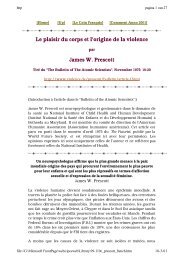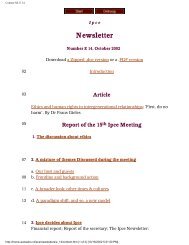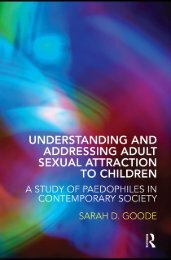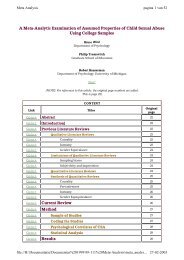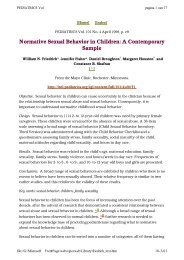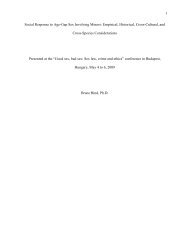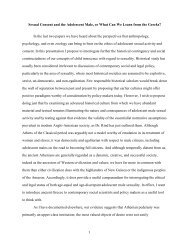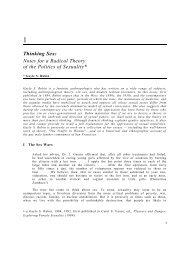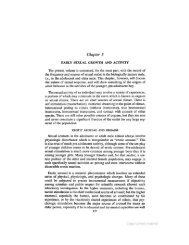Infant and Child Sexuality: A Sociological Perspective - Ipce
Infant and Child Sexuality: A Sociological Perspective - Ipce
Infant and Child Sexuality: A Sociological Perspective - Ipce
Create successful ePaper yourself
Turn your PDF publications into a flip-book with our unique Google optimized e-Paper software.
personal event as peers take note of this phenomenon <strong>and</strong> the individual<br />
is made to feel the approval or disapproval of the group.<br />
I was a little wary of this (the appearance of<br />
pubic hair) myself. Those who grew pubic hair<br />
early were teased, but at the same time there<br />
was a feeling of jealousy on the part of the<br />
others. I was about average <strong>and</strong> accepted it as a<br />
symbol of masculinity.<br />
A friend <strong>and</strong> I or even a group of us would sit<br />
around <strong>and</strong> compare penises. During most of these<br />
comparisons, we would experience erections,<br />
which we thought was funny. We watched to see if<br />
our hairs had started to grow. For several weeks<br />
we watched closely (once in a while checking<br />
with a magnifying glass). Finally the big day<br />
came for me. I was so proud <strong>and</strong> excited that I<br />
showed many of my friends <strong>and</strong> even my sister who<br />
was just a year younger than I was. It wasn’t<br />
too long after my pubic hair growing incident<br />
<strong>and</strong> after many attempts to reach climax, that I<br />
finally succeeded to climax. Again this was a<br />
proud <strong>and</strong> very important thing in my life at<br />
that time.<br />
Why does the group sometimes react with teasing? It is partly because<br />
the appearance of pubic hair is a new phenomenon that must be<br />
recognized. Yet, knowing what we do about the quality of sex information<br />
of youth in the United States, the group members are not sure what<br />
the proper reaction should be. Teasing may well be a good compromise.<br />
It recognizes the phenomenon without clearly designating its meaning or<br />
importance.<br />
The preadolescent boy begins to exchange his sexual information<br />
with others by age eight or nine if he has not done so earlier. There<br />
is “hunger for knowledge” at this age. Many boys of this age are not so<br />
lucky as to find helpful literature readily available.<br />
Just before puberty I (a boy) had a hunger for<br />
knowledge. I read all the sex literature I could<br />
get my h<strong>and</strong>s on. This literature was sexually<br />
arousing in the true sense of the word, <strong>and</strong> I<br />
would become quite stimulated. I began having<br />
frequent erections <strong>and</strong> found new pleasure associated<br />
with the genitals.<br />
Erection comes on much more quickly in preadolescent boys than in<br />
adults though the speed in which climax is reached in preadolescent<br />
males varies considerably in different boys as it does in adult males.<br />
In preadolescents, the capacity to achieve repeated orgasms in limited<br />
periods of time exceeds the capacity of teenage boys, who in turn are<br />
more capable than are men. (Kinsey, 1948, p. 178-179).<br />
Ramsey (1943), in studying the erotic responsiveness of nearly 300<br />
boys from an urban junior high school in a middle-sized Midwestern city<br />
(the respondents were mostly white, middle-class, <strong>and</strong> Protestant),<br />
77



